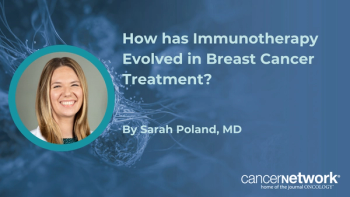
PALB2 Germline Mutations Moderately Increased Risk of PALB2-Related Breast Cancer in China
This study analyzed the full prevalence and spectrum of partner and localizer BRCA2 (PALB2) germline mutations in China, focusing on the associations between these PALB2 germline mutations and breast cancer risk.
A comprehensive spectrum of partner and localizer BRCA2 (PALB2) germline mutations and characteristics of PALB2-related breast cancer in China were revealed, according to a recent study published in Cancer.
While PALB2 germline mutations confer a moderately increased risk for breast cancer, these mutations “profoundly increase breast cancer risk” for patients aged 30 years old or younger in this Chinese population.
“This study has revealed a comprehensive spectrum of PALB2 germline mutations and characteristics of PALB2-related breast cancer in China,” wrote the researchers. “PALB2 germline mutations conferred a moderately increased risk for breast cancer but profoundly increased breast cancer risk for those aged 30 years or younger.”
Overall, deleterious PALB2 mutation carriers accounted for 0.97% (n = 160) in the main breast cancer cohort and for 0.19% (n = 11) in the healthy control cohort. In total, 41 novel PALB2 germline mutations were detected, with these mutations significantly associated with increased breast cancer risk (odds ratio [OR], 5.23; 95% CI, 2.84-9.65; P< .0001), especially among women 30 years old or younger (OR, 10.09; 95% CI, 3.95-25.79; P< .0001).
Even more, a number of characteristics were closely related to PALB2 mutations, including family history, bigger tumor size, triple-negative breast cancer, positive lymph nodes, and bilateral breast cancer.
The researchers analyzed 16,501 BRCA1/2-negative patients with breast cancer in this study. The sample was drawn from 10 different provinces in China, with 5890 women enrolled as a healthy control group.
“Because loss-of-function mutations in the PALB2 gene confer a predisposition to breast cancer, clinical genetic testing for breast cancer risk increasingly includes PALB2 in addition to BRCA1and BRCA2,” wrote the researchers.
The researchers explained that they successfully analyzed a large, unselected population with sufficient PALB2mutation carriers for the study. It pictured the spectrum and calculated the breast cancer risk for PALB2germline mutation carriers in a Chinese population.
As for the limitations, there was a decent amount of missing data regarding tumor size and lymph node status of PALB2 mutation noncarriers. Even though the proportions of bigger tumors and positive lymph nodes were similar to the findings of other studies, this was not confirmed in the researchers’ own data. More, the treatment regimens and effects were not analyzed for carriers because the overall mortality rate for this group was too low to support any further analysis.
“Patients with breast cancer and PALB2 germline mutations had distinctive clinical characteristics,” wrote the researchers. “An analysis of survival and different treatment effects for PALB2 mutation carriers needs to be further investigated.”
Reference:
Zhou J, Wang H, Fu F, et al. Spectrum of PALB2 Germline Mutations and Characteristics of PALB2-Related Breast Cancer: Screening of 16,501 Unselected Patients With Breast Cancer and 5890 Controls by Next-Generation Sequencing. Cancer. DOI: 10.1002/cncr.32905.
Newsletter
Stay up to date on recent advances in the multidisciplinary approach to cancer.













































